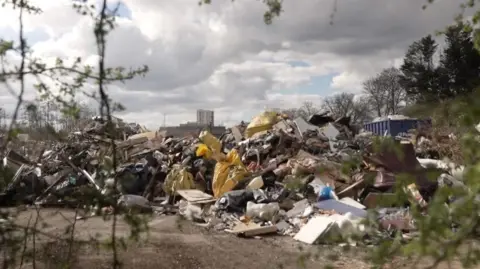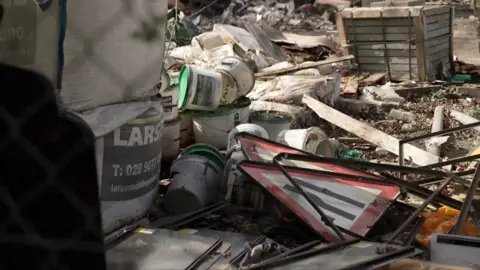London boroughs raise fly-tipping fines to £1,000
 BBC
BBCCouncils across London are increasing fines to £1,000 as part of a fly-tipping crackdown.
The fine, known as a fixed penalty notice (FPN), used to be £400. Some boroughs are also increasing the number of environment officers patrolling the streets to deter offenders.
The latest government data, from the Department for Environment, Food & Rural Affairs (DEFRA), suggests fly-tipping is on the rise and is worse in London than anywhere else in the country.
Campaigners say putting up fines is a good start but more action needs to be taken to tackle the issue.
Fly-tipping is a criminal offence under the Environmental Protection Act 1990.
According to the environmental charity, Keep Britain Tidy, fly-tipping is defined as the illegal deposit of any waste on to land that does not have a licence to accept it and costs councils millions of pounds each year to clear up.
Now, about half of London councils have told BBC London they are, or have already, increased fly-tipping FPNs to the maximum amount of £1,000, in an effort to reduce the growing problem.
These boroughs include:
- Bexley
- Brent
- Bromley
- Camden
- Ealing
- Enfield
- Hammersmith and Fulham
- Harrow
- Hillingdon
- Kensington and Chelsea
- Lewisham
- Redbridge
- Richmond
- Southwark
- Tower Hamlets
- Wandsworth.

The latest data from DEFRA found that in 2023-24, local authorities in England dealt with 1.15 million fly-tipping incidents, an increase of 6% from the 1.08 million incidents reported in 2022-23.
The most common size category for fly-tipping incidents in 2023-24 was equivalent to a small van load - 31% of total incidents - followed by the equivalent of a car boot or less, at 28%.
During that period, 47,000, or around 4% of total incidents, were of tipper lorry load size or larger, which is an increase of 11% from 42,000 in the year before. For these large fly-tipping incidents, DEFRA found the cost of clearance to local authorities in England in 2023-24 was £13.1m.
'Not a victimless crime'
One resident in Notting Hill told BBC London she finds the amount of fly-tipping hear where she lives "upsetting".
"I feel like it takes away pride from the community. Having to see the rubbish makes it feel like not a very nice place and then having rubbish dropped there like that attracts rodents."
Another person said: "It's quite sad because I think London is such a beautiful city and it takes away from the beauty of the city and what it has to offer."
Local councils are asking Londoners to report any sightings, of any kind, to help better track down whoever is responsible.
Allison Ogden-Newton, from Keep Britain Tidy, said fly-tipping across the country was out of control and that the capital was "no exception".
"Fines going up is a really good idea because we need a disincentive to the criminals that are carrying out this act, but we also have to catch them, which is no small matter."
She added: "We've been asking for a review of the sentencing guidelines, because although sentences could be much harsher for those that are convicted of fly-tipping, magistrates tend not to issue severe fines and even prison sentences, which they can, because they perceive this to be a victimless crime.
"Anyone who is living in a community that is regularly fly-tipped knows this is not a victimless crime."
Listen to the best of BBC Radio London on Sounds and follow BBC London on Facebook, X and Instagram. Send your story ideas to [email protected]
